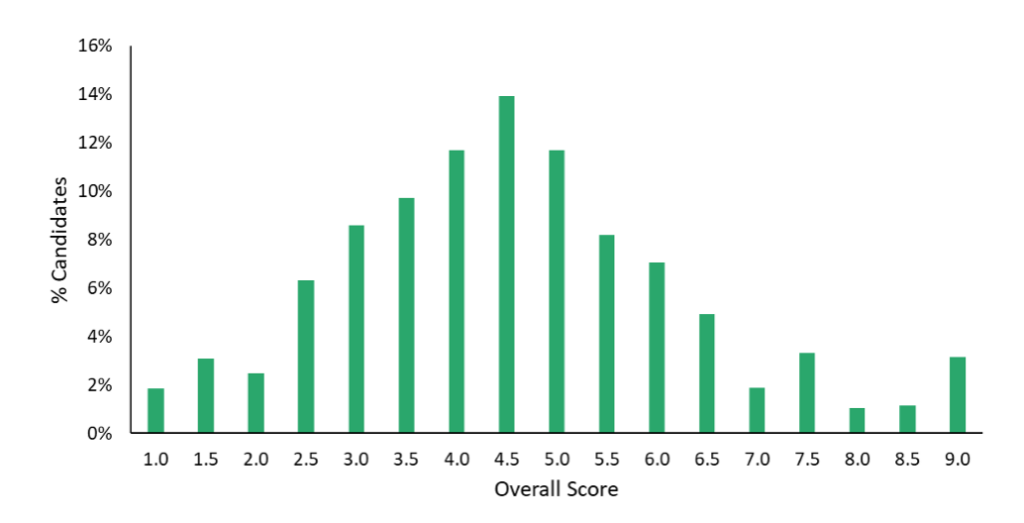The TMUA is part of the application process for a number of different courses at Cambridge, such as Economics and Computer Science.
If you are due to sit the TMUA, you might be wondering how the Admissions test is scored and how your results will be presented to you.
Which is why we have put together this guide going over everything you need to know about the scoring and results of the TMUAA.
TMUA Scores 2024
The TMUA Results for the October 2024 sitting have been released. You can learn more about them here:
What makes the TMUA scoring so different?
Throughout your schooling so far, the exams you have sat have most likely been scored as a percentage with the aim of getting as close to 100% as you can.
The scoring of the TMUA does not follow this method, and this guide will help you decipher how this works and how to interpret your results.
The World’s First Oxbridge Preparatory School
Welcome to UniAdmissions, the world’s first Oxbridge preparatory school with an Oxbridge success rate of 57% and with over 500+ UniAdmissions students placed at Oxford and Cambridge.
Performing well in the TMUA is crucial for your application. Our TMUA Tuition Programme prepares you to score highly through one-to-one tuition sessions, intensive courses, and more. Click the button below to discover our TMUA Programme.
TMUA Results 2024
The results for the 2024 October sitting of the TMUA were released on November 26th, so let’s review how the cohort did with the test in its new computer-based format.
TMUA Score Distribution 2024
Although the TMUA is split into two separate papers, UAT-UK (the exam organiser behind the TMUA) has only published the overall scores for each applicant. This chart displays what percentage of the cohort achieved each score from 1.0 – 9.0 (rounded to the nearest .5).
Firstly, it’s important to understand that due to the score conversion process for the test, scores of 1.0 and 9.0 encompass a range of different raw marks. Each subtest has a defined cut-off beyond which the score cannot increase or decrease, meaning that multiple candidates may receive these scores despite achieving different raw totals at the extreme upper or lower ends of the scale.
From this chart, we can see that the most common score was 4.5, with roughly 14% of applicants achieving it. The majority of applicants scored between 3.0 and 5.0 (around 43%), meaning a score in this range would be fairly average and won’t help you stand out in the application process.
We suggest that a good score to aim for in the TMUA is 6.5+. As we can see, only around 15% of test takers got a score in this range, with 3% scoring 9.0. If you’re able to score in this range, you’ll have a very good chance of getting an interview!
When do you get your TMUA results?
Firstly, you will likely be wondering when you actually get your results. UAT-UK states that scores will be sent to students roughly 6 weeks after the test dates.
That means that applicants who sit the TMUA in October will receive their results towards the end of November, while those who sit the January sitting will receive theirs in mid-February. You’ll be emailed a PDF document with your final score.
You will not need to do anything before or after receiving your results, as your results will be passed directly to the Cambridge college that you have applied to (or Imperial College London if applying there).
How is the TMUA Scored?
The TMUA is split into two sections, with 150 raw marks available across them. There is no negative marking in the TMUA.
However, your TMUA result will be presented to you as a score ranging between 1.0 (lowest) and 9.0 (highest) – with typical candidates scoring around 4.0.
Approximately 10% of applicants will achieve scores higher than 7.0. Low scores are capped at 1.0.
Your score on the test will be based on your overall performance on both papers. You will also be given a score for each of the two papers, but these for only for informational purposes and do not form part of your formal test result.
To get the reported score, though, the marks need to be converted from their raw marks.
TMUA Score Conversion
The conversion is adjusted each year in line with the results that candidates achieve.
However, by looking at the conversions from 2021 (taken by those applying for 2022 entry), we can see how this has been applied.
| Paper 1 Raw Score | Paper 1 Reported Score |
|---|---|
| 20 | 9.0 |
| 19 | 9.0 |
| 18 | 8.3 |
| 17 | 7.9 |
| 16 | 7.6 |
| 15 | 7.3 |
| 14 | 7.0 |
| 13 | 6.8 |
| 12 | 6.6 |
| 11 | 6.1 |
| 10 | 5.6 |
| 9 | 5.0 |
| 8 | 4.5 |
| 7 | 3.9 |
| 6 | 3.3 |
| 5 | 2.6 |
| 4 | 1.9 |
| 3 | 1.0 |
| 2 | 1.0 |
| 1 | 1.0 |
| 0 | 1.0 |
Paper 2
| Paper 2 Raw Score | Paper 2 Reported Score |
|---|---|
| 20 | 9.0 |
| 19 | 9.0 |
| 18 | 8.3 |
| 17 | 7.8 |
| 16 | 7.5 |
| 15 | 7.2 |
| 14 | 6.9 |
| 13 | 6.7 |
| 12 | 6.3 |
| 11 | 5.7 |
| 10 | 5.1 |
| 9 | 4.5 |
| 8 | 3.9 |
| 7 | 3.3 |
| 6 | 2.7 |
| 5 | 1.9 |
| 4 | 1.1 |
| 3 | 1.0 |
| 2 | 1.0 |
| 1 | 1.0 |
| 0 | 1.0 |
Overall
| Overall Raw Score | Overall Reported Score |
|---|---|
| 40 | 9.0 |
| 39 | 9.0 |
| 38 | 9.0 |
| 37 | 8.6 |
| 36 | 8.3 |
| 35 | 8.1 |
| 34 | 7.9 |
| 33 | 7.7 |
| 32 | 7.5 |
| 31 | 7.4 |
| 30 | 7.2 |
| 29 | 7.1 |
| 28 | 7.0 |
| 27 | 6.8 |
| 25 | 6.6 |
| 24 | 6.5 |
| 23 | 6.2 |
| 22 | 5.9 |
| 21 | 5.6 |
| 20 | 5.4 |
| 19 | 5.1 |
| 18 | 4.8 |
| 17 | 4.5 |
| 16 | 4.2 |
| 15 | 3.9 |
| 14 | 3.6 |
| 13 | 3.3 |
| 12 | 3.0 |
| 11 | 2.6 |
| 10 | 2.3 |
| 9 | 1.9 |
| 8 | 1.5 |
| 7 | 1.1 |
| 6 | 1.0 |
| 5 | 1.0 |
| 4 | 1.0 |
| 3 | 1.0 |
| 2 | 1.0 |
| 1 | 1.0 |
| 0 | 1.0 |
Access "The Big Book Of Oxbridge Applications" For FREE
Preparing for the TMUA? Discover more about this test and everything else you need to know about the Cambridge admissions process in The Big Book Of Oxbridge Applications, available for free here! Through over 350 pages, you will find:
- 28 example Oxbridge Personal Statements
- Over 40 admissions test practice questions
- Interviews with Oxbridge students and graduates
- Additional downloadable resources
Fill in your details below to claim your digital copy today!
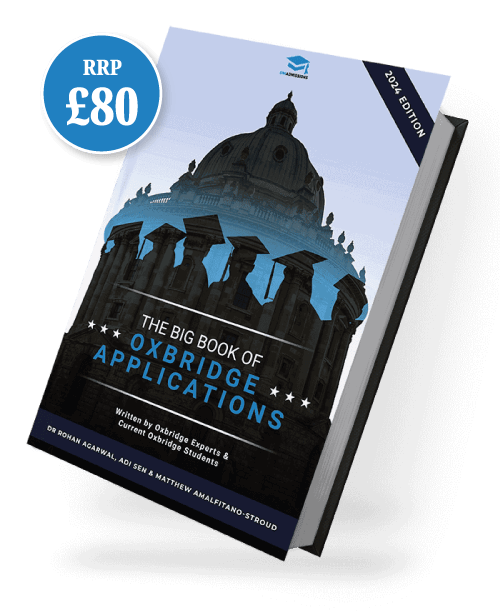
What Can we learn from past TMUA Scores?
Although the TMUA is now run by a different examining body, the previous one had kept records of previous TMUA results.
This means, if you so wish, you can take a more thorough and detailed look at the results to see how previous years have shaped up.
Do remember that this is based on the performance of that year and the difficulty of the paper so every year will be different.
The distribution of scores (seen below) is used to clearly show candidates just how similarly matched applicants are. The scale has been designed so that approximately one-third of candidates will achieve overall scores higher than 6.5.
The most exceptional applicants will achieve a 7.0+. With this in mind, we can take a look at the 2021 TMUA results.
TMUA Paper 1 2021 Results
Below you can see the score distributions for Section 1 of the TMUA
This is a fairly standard representation of a scoring distribution, with the scores rising to a peak before going down.
The scores peak at 5.0 with around ~11% of candidates achieving this score.
Do make sure to remember that this table is purely for informational purposes and is not part of your formal test result.
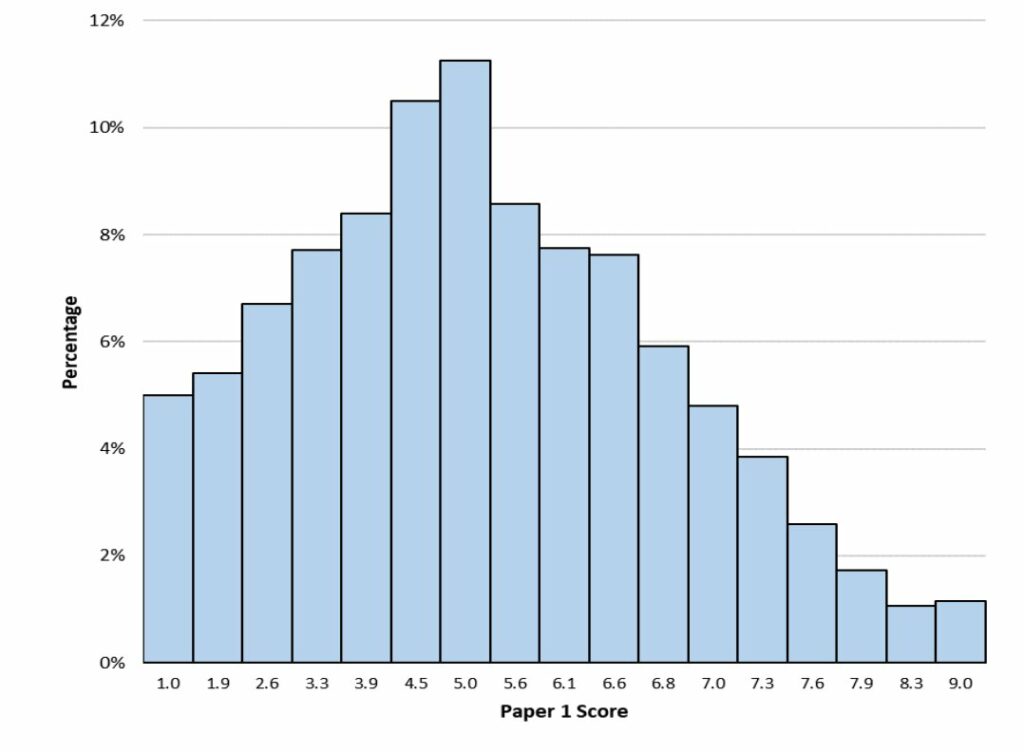
TMUA Paper 2 2021 Results
As with Paper 1, this table is a fairly typical representation of the scoring distribution.
The scores peak a little higher than in Paper 1 with ~10% of candidates scoring a 5.1.
We can also see that ~15% of applicants have achieved above 7.0.
As mentioned with Paper 1, remember that this forms no part of your formal results and is just purely informational.
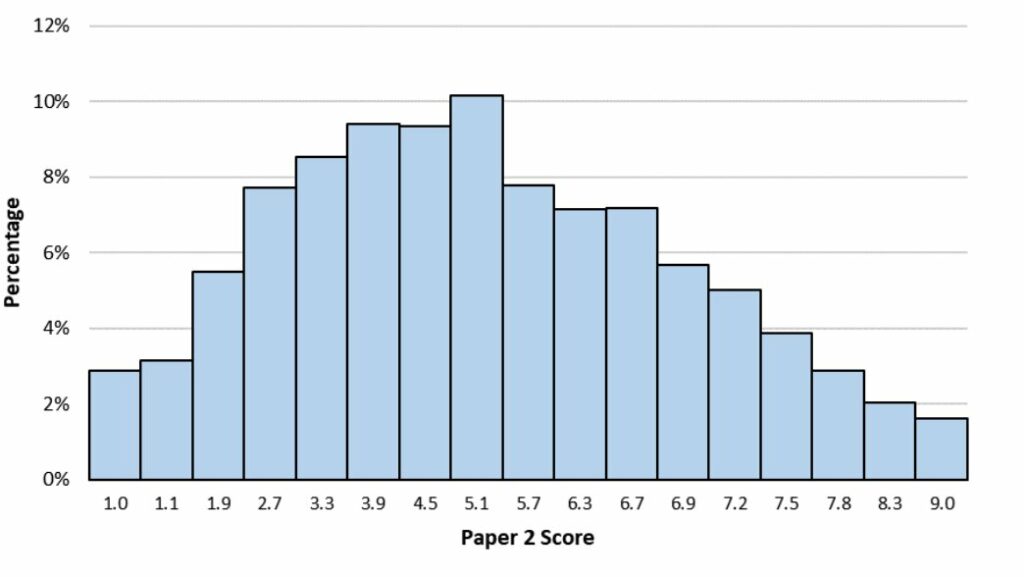
TMUA 2021 Overall Results
As already mentioned, this is the distribution that really matters and is that which is actually your results.
We know that the results are done how they are so that one-third of applicants score a 6.5 or above, and we can see that that is roughly the case here.
The dip in results at 5.1 is interesting to note with 4.0% of applicants achieving this before the scores peak again.
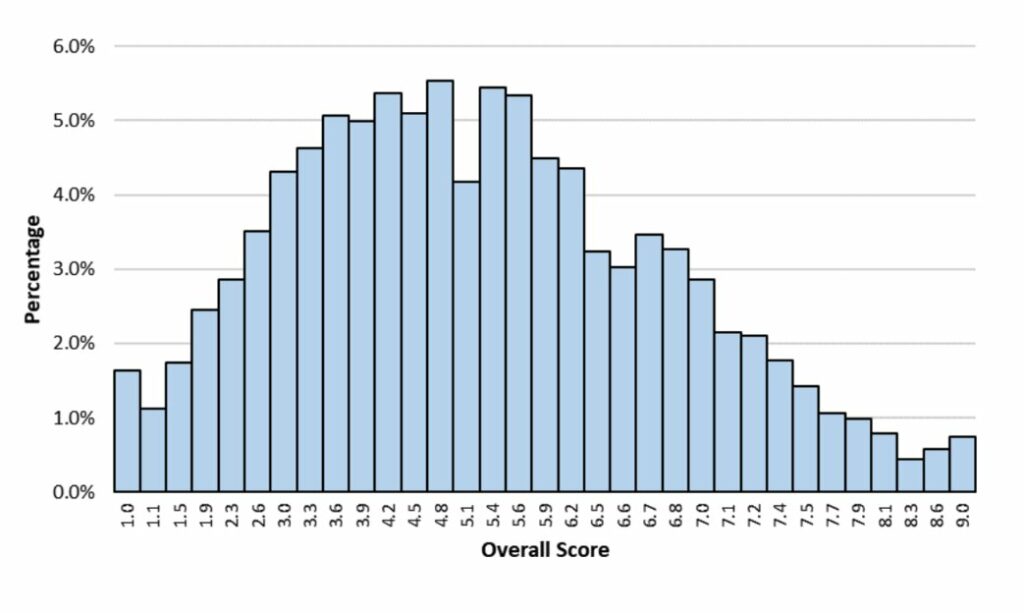
what are good, average, and low TMUA scores?
The distribution tables above provide an idea of what scores candidates have achieved, with a brief explanation of the tables themselves. But what actually is a good, average, or low score?
Based on what we have seen for the previous year’s results and the information provided by CAAT, we can see a pattern in regard to the scores. These can be categorised as follows:
What is a Good TMUA Score?
It is generally agreed that anything from 6.5 and above is considered a good TMUA score. Only the most exceptional applicant will achieve beyond this. As you can see in the distribution charts above, around this mark is where there is a drop-off in the results. By achieving a 6.5 or higher, you will be placing yourself in a very competitive position with your Cambridge application.
What is an Average TMUA Score?
For the average TMUA score, you would be looking at anything between 4.0 and 6.5.; the vast majority of applicants will find themselves in this category. Falling into this range means that your TMUA score is not likely to make you stand out against candidates with similar credentials, so you must ensure the three other aspects of your application are as strong as possible.
What is a Low TMUA Score?
Anything below a 4.0, therefore, is considered a low TMUA score. Do not feel disheartened by getting this score, as it is not a failure. Remember your performance will be weighed against your fellow cohort, so there is always a chance of still getting an Interview – just make sure you ace it!
Conclusion
Hopefully, from the above, you have a better understanding of how the scoring and results of the TMUA works.
What is key to remember is that the conversion table and the distribution of results are not set in stone and will fluctuate each year due to the perceived difficulty of the Admissions Test.
Whatever your TMUA score may be, remember that it is only a fraction of what makes up your Cambridge application. With a strong Personal Statement and exam results, even the lowest NSAA scores will not hold back your application. You can find a range of practice past papers for the TMUA if you do want to maximise your chances of scoring well.
Maximise your TMUA score through effective TMUA preparation.
The TMUA is a vital component of your Cambridge application so scoring highly can mean the difference between an offer or rejection. At UniAdmissions, we are experts at boosting your TMUA score and maximising your chances of gaining a place.
Discover our TMUA Programme by clicking the button below to enrol and triple your chances of success.

